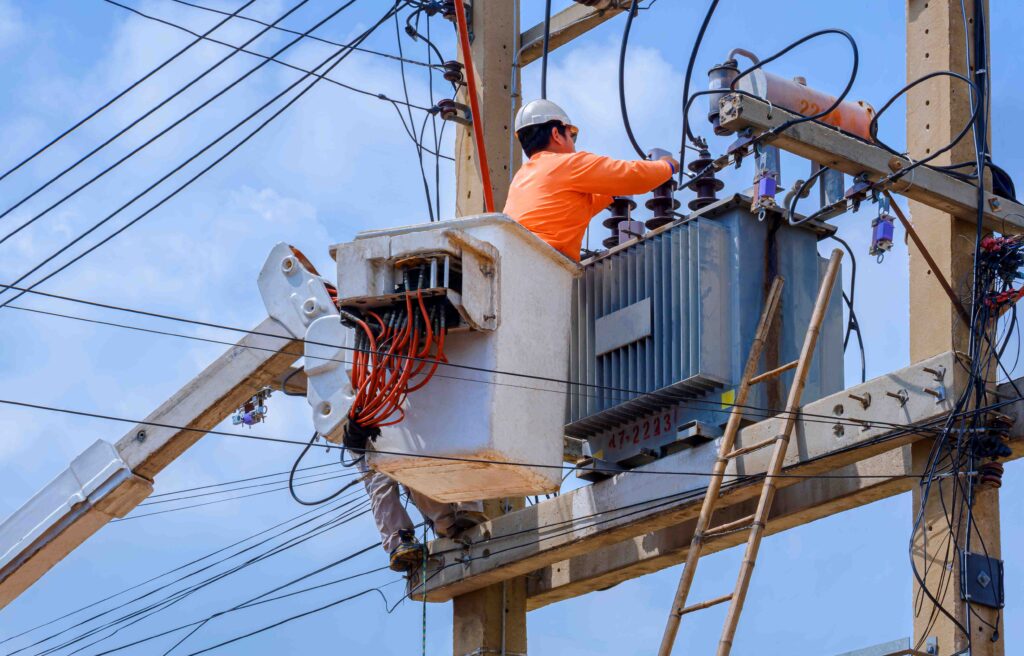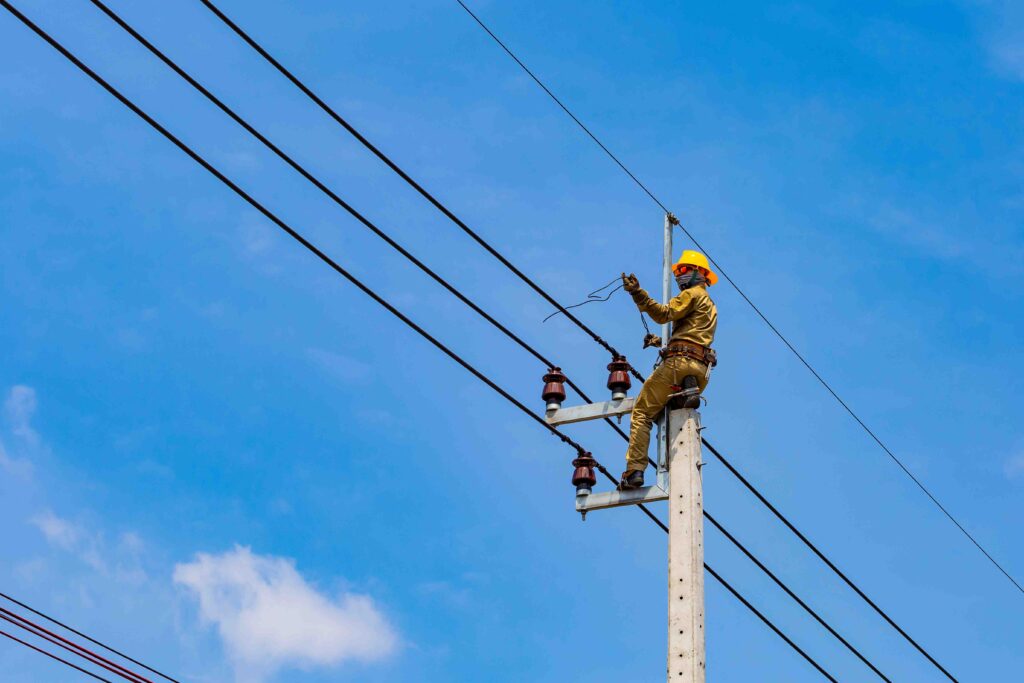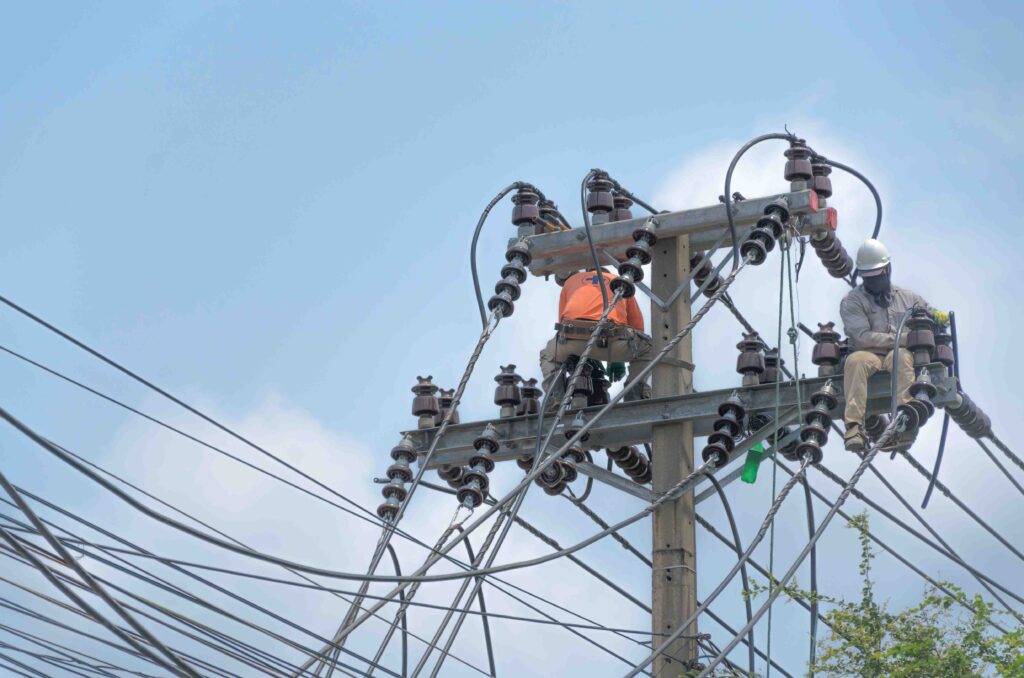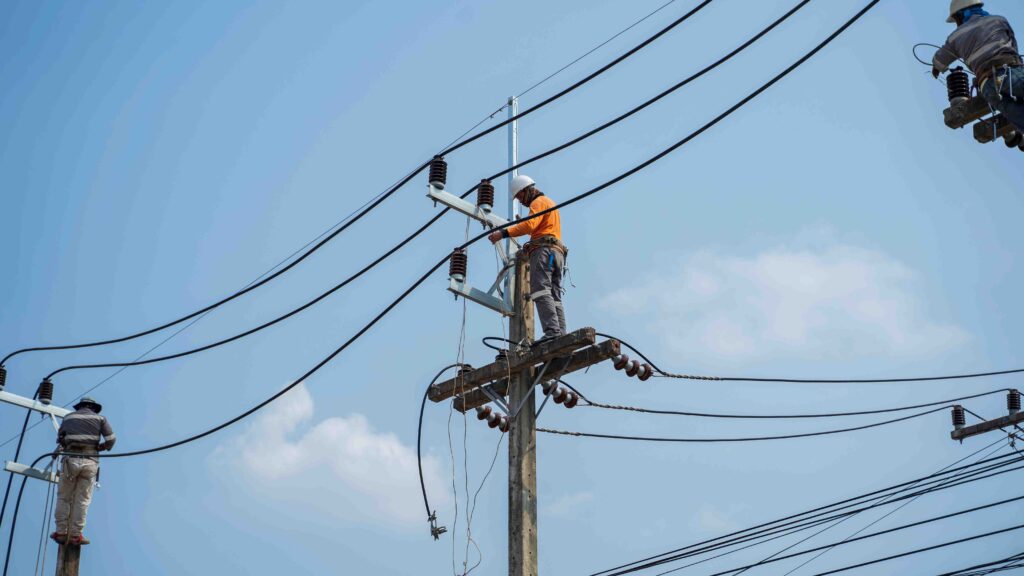Lineman jobs involve installation, maintenance, and repair of electrical power systems. These skilled workers ensure reliable electricity supply to residences and businesses.
Embarking on a lineman career requires both physical stamina and technical knowledge. Linemen are the unsung heroes who work at great heights and in various weather conditions, tackling the critical task of keeping the power flowing. Their roles encompass setting up poles, laying cables, and performing emergency repairs during power outages.
Training is a mix of classroom instruction and hands-on experience, typically obtained through apprenticeships. Safety is paramount in this field, demanding strict adherence to protocols. As infrastructure ages and new technologies emerge, demand for lineman positions remains steady, offering job security and competitive compensation. For those who enjoy outdoor work and possess problem-solving skills, lineman jobs offer a fulfilling career path.
What Are Lineman Jobs?
Powering Our World: that’s what linemen do every day. These skilled workers build and maintain the complex network of power lines. They keep the lights on and the machines running smoothly. A demanding yet rewarding career, lineman jobs are essential to our modern way of life.
The Definition Of A Lineman
A lineman is a tradesperson who specializes in the installation, maintenance, and repair of electrical power systems. This includes overhead and underground lines. Linemen also work on related equipment like transformers and circuit breakers. Safety is key, as these workers often face high-voltage environments.
Types Of Lineman Jobs
- Apprentice Lineman: Starts with learning the ropes and basic skills.
- Journeyman Lineman: After years of training, manages complex tasks on their own.
- Master Lineman: With vast experience, handles the toughest jobs, leading teams.
- Electrical Lineman: Focuses on power transmission and distribution to homes and businesses.
- Telecommunications Lineman: Installs and repairs the lines that enable high-speed internet and telephone services.

The Importance Of Lineman Jobs
Linemen play a vital role in our lives, connecting us to the power that lights our homes, runs our businesses, and powers our communities. Their jobs are essential, demanding, and often performed under challenging conditions.
Connection To The Power Grid
Linemen are the guardians of our power grid. They ensure electricity flows from power plants to our streets. They climb tall poles and work with complex equipment. Their work keeps our lights on and machines running. Their skills in grid connection are unmatched.
Maintaining Power To Communities
- Regular inspection of lines and hardware
- Preventive maintenance to avoid disruptions
- Emergency repairs, sometimes in extreme weather
Linemen work tirelessly to keep electricity reaching our homes, schools, and hospitals. They are the unsung heroes who ensure our daily life goes on without interruption.
Resolving Power Outages
When power lines are down, linemen spring into action. They pinpoint issues and resolve them swiftly. Safety is their top priority. Linemen brave harsh conditions to restore power. They often work round the clock to turn our lights back on.
Career Paths In Lineman Jobs
Exploring career paths in lineman jobs unveils a world of dynamic opportunities. Wired with the promise of growth, these paths charge careers with exciting potential. Begin an electrifying journey in a trade that powers our world.
Apprenticeship Programs
Apprenticeship programs lay the foundational circuit for aspiring linemen. These programs combine classroom learning with on-the-job training. Participants earn while they learn, gaining hands-on experience under expert guidance.
- Duration: Typically 3-5 years
- Qualifications: High school diploma or equivalent
- Certification received: Lineman Apprentice Certificate
Journeyman Lineman Careers
Journeyman linemen ascend with refined skills. Post-apprenticeship, they handle complex electrical systems with independence. Safe operation and problem-solving are key skills they master.
| Responsibilities | Salary Potential | Advancement |
|---|---|---|
| Repair and maintain lines | Competitive wages | Eligibility for promotions |
| Operate various equipment | Bonuses possible | Leadership opportunities |
Master Lineman Careers
Reaching the pinnacle, master linemen boast vast experience. With a deep knowledge base, they often take on roles that include supervising crews and managing major projects.
- Expertise: High-level problem solving
- Leadership: Crew management, training
- Opportunities: Senior positions within utilities
What Do Linemen Do?
Linemen are the unsung heroes who keep our lights on and power-humming. These skilled workers brave the height and the elements to build, maintain and repair the electric power systems. Let’s dive into the specifics of what linemen do on the job.
Install And Maintain Power Lines
High above the ground, linemen erect utility poles and string cables that form the backbone of our electrical infrastructure. They connect transformers and ensure everything is properly grounded for safety. This work is vital for keeping the flow of electricity consistent and reliable.
Repair And Troubleshoot Electrical Systems
When the power goes out, linemen are on it. They find the problem and make repairs, whether it’s a downed line or a complex issue at a substation. These professionals possess a deep understanding of electrical systems, which they use to restore service quickly and efficiently.
Performs Safety Checks
Safety checks are a regular duty for linemen. They inspect equipment, tools, and power lines to ensure everything is in top working order. This prevents incidents and guarantees that the power supply to homes and businesses is not only steady but also safe.
Emergency Response And Disaster Recovery
In the face of natural disasters, linemen are first responders for our electrical grid. They assess damage, clear hazards, and rebuild infrastructure. Their prompt actions help communities get back on their feet after storms, fires, or other emergencies.
Skills Needed To Be A Successful Lineman
The right set of skills can transform an average lineman into an exceptional one. Linemen are the unsung heroes who keep our lights on and our homes warm. Their job is critical, hands-on, and challenging. To succeed in this demanding field, one must possess a unique combination of physical prowess, technical insight, sharp problem-solving abilities, and effective communication skills. These core attributes are essential for anyone aspiring to master the lineman trade and excel in the field.
Physical Fitness And Endurance
Linemen need to be in top physical condition. They often climb poles or towers, which demands strength and stamina. Tasks are not just at height but also in all weather conditions. This requires a level of fitness that ensures safety and efficiency. From lifting heavy equipment to maneuvering in tight spaces, a lineman’s physical endurance is constantly tested.
- Ability to climb and work at heights
- Strength to handle heavy equipment
- Stamina to work long hours, often in harsh weather
Technical And Mechanical Aptitude
Understanding the technical aspects of the job is vital. Linemen deal with complex electrical systems. They must read and comprehend blueprints and electrical schematics. Mechanical skills are just as critical. Linemen work with a variety of tools and machinery that require an informed approach.
| Technical Skills | Mechanical Skills |
|---|---|
| Blueprint reading | Tool proficiency |
| Understanding of electrical systems | Machinery operation |
| Knowledge of safety protocols | Maintenance of equipment |
Problem-solving Skills
Every day brings a new challenge for linemen. They must quickly identify issues and devise solutions. Solid problem-solving skills enable linemen to address unexpected situations, such as power outages or damaged lines, effectively and efficiently.
- Analyzing complex situations
- Identifying the root cause of electrical issues
- Implementing practical solutions under pressure
Communication Skills
Clear communication is crucial for linemen. They work in teams and must convey information precisely. Whether it’s coordinating with fellow crew members or explaining technical details to customers, good communication ensures safety and clarity on the job.
- Effective team collaboration
- Clear instructions sharing
- Customer service and education

Training And Education Required For Lineman Jobs
Becoming a lineman involves specialized knowledge and skills. To prepare for this career, certain education and training are must-haves. Read on to discover the steps to become a qualified lineman.
High School Education
Starting with a basic high school education is essential. Maths and physics are important subjects. Hands-on shop classes can give you an edge. If your high school offers electrical systems courses, that’s a great bonus.
Vocational School And Apprenticeship Programs
Post-high school, consider a vocational school. These schools offer programs specifically for future linemen. After vocational school, you’ll need an apprenticeship. Apprenticeships typically last up to four years. You’ll get paid while you learn on the job. Below is the usual process:
- Apply for an apprenticeship program.
- Complete classroom instruction coupled with on-the-job training.
- Log a required number of hours to advance.
Certifications And Continuing Education
To keep skills sharp, linemen pursue continuing education. Some certifications are also mandatory. The Electrical Power Testing certification, for instance, is widely recognized. Others include the following:
- Commercial Driver’s License (CDL)
- Certified Utility Safety Professional (CUSP)
- OSHA Safety Certifications
Keeping up with industry standards and safety protocols is crucial. Make sure to stay informed about any new requirements.
Salary And Job Outlook For Lineman Jobs
The prospect of a career as a lineman can be quite intriguing for those who enjoy working outdoors and do not shy away from heights. Understanding the potential salary and job outlook is crucial for anyone considering this line of work. Let’s delve into the financial and career development aspects of becoming a lineman.
Salary Ranges For Lineman Jobs
One important factor for career choice is compensation. Linemen’s earnings can vary widely. Factors include experience, location, and employer type. Entry-level linemen may start with lower salaries. But with time and experience, higher earnings are common.
The median salary for linemen, as reported by the Bureau of Labor Statistics, is $72,520 annually. However, the top 10% can earn more than $100,000. Understand that these numbers are not stagnant. Overtime can significantly boost overall earnings.
Here’s a quick view of the salary ranges:
| Experience Level | Salary Range |
|---|---|
| Entry-Level | $38,000 – $52,000 |
| Mid-Career | $50,000 – $75,000 |
| Experienced | $75,000 – $100,000+ |
Job Growth In Lineman Jobs
The demand for skilled linemen is expected to grow consistently. This growth links closely to the need for power grid updates and expansions. The U.S. Bureau of Labor Statistics projects a 8.9% growth rate by 2030 for this field.
This rate surpasses the average for all occupations. The increased focus on green energy and the retirement of current linemen also contribute to new opportunities.
Potential Advancements In The Lineman Field
A lineman’s journey does not end at repairs and installations. With experience, many advance into supervisory roles or become lead linemen. Some even pursue positions in management or as trainers. Diverse utility companies offer varied growth paths.
Certifications and additional training can pave the way for these advancements:
- Certified Power Lineman credentials
- Electric Utility Safety and Training programs
- Leadership development courses
For ambitious individuals, potential steps up the career ladder could look like this:
- Apprentice Lineman
- Journeyman Lineman
- Lead Lineman/Foreman
- Utility Manager
Continuous learning and skill advancement remain keys to success in this evolving field.

The Future Of Lineman Jobs
As technology evolves, lineman jobs are changing. Traditionally, linemen have worked with electrical power systems and telecommunications. But the future holds new challenges and opportunities. Technological advancements, environmental policies, and the shift towards renewable energy are reshaping the landscape of lineman work. Linemen must now adapt to the changing demands and skill sets required in this dynamic field.
New And Evolving Technologies
Technology continues to transform lineman jobs. Smart grid technologies bring more efficiency to power distribution. They need workers skilled in automation and data management. Robotics and drones aid in inspection and repair tasks, requiring linemen to learn new ways to maintain the power grid. Adaptation to these technologies ensures a lineman’s role remains critical in the power industry.
Environmental Conservation And Sustainability Efforts
Environmental initiatives impact lineman occupations. Workers often implement solutions that reduce environmental harm. They play a significant role in sustainable infrastructure projects. From installing LED streetlights to setting up systems that minimize electrical losses, each action taken by a lineman supports the environment.
Increased Demand For Renewable Energy Technicians
Renewable energy drives a surge in demand for skilled technicians. Solar and wind power projects are on the rise. Linemen with the know-how to work on these systems are essential. They install, maintain, and repair components that harness natural energy. A strong understanding of renewable technologies positions linemen at the forefront of this industry shift.
Frequently Asked Questions Of Lineman Jobs
What Is The Highest Paying Lineman Job?
The highest-paying lineman job is typically with major electric power companies, often involving specialized skills such as transmission line work. Senior linemen positions in high-demand locations offer the highest salaries.
Can You Make 6 Figures As A Lineman?
Yes, linemen can earn a six-figure salary, typically with experience, overtime, and working in areas with higher pay scales.
What Does Lineman Do?
Linemen install and repair electrical power systems and telecommunications cables. They work on power lines, maintain electricity infrastructure, and ensure the safe transmission of energy.
Is Lineman A Tough Job?
Yes, being a lineman is a tough job. It involves physical labor, working at heights, and exposure to extreme weather conditions. Linemen must also adhere to strict safety protocols due to the high-risk nature of the work.
Conclusion
Embarking on a lineman career promises adventure and steady growth. This path offers both challenges and ample rewards, preparing you for a future energized with potential. Aspiring lineworkers, it’s time to climb high – your opportunity awaits in the vast network of electrical grids.
Secure your gear; the journey to empowering communities begins now.


